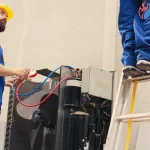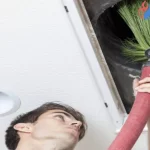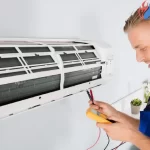What are the signs that your AC system is malfunctioning and needs professional attention?
Maintaining a comfortable indoor environment is crucial, and a functioning AC system plays a vital role in achieving that. However, AC systems can experience malfunctions that can disrupt the desired coolness and airflow in your home. It’s important to be aware of the signs that your AC system is malfunctioning & needs professional attention, which we will explore in this article.
Understanding your AC System
To understand the signs of a malfunctioning AC system, it is helpful to have a basic understanding of how it works. AC systems are composed of several components that work together to cool the air. The process involves the evaporation of a refrigerant, which absorbs heat from the air, and then the condensation of the refrigerant, which releases the heat outside. This cycle repeats to maintain a cool indoor temperature.
Regular Maintenance and Its Role
Regular maintenance is crucial for the optimal functioning of AC systems. It not only helps prevent potential issues but also ensures the longevity and efficiency of your unit. By scheduling regular maintenance, you can keep your AC system clean, identify small problems before they become major ones, and save on energy costs in the long run.
Some benefits of regular maintenance include improved air quality, extended system lifespan, increased energy efficiency, and reduced chances of unexpected breakdowns.
Signs that your AC System is Malfunctioning
A. Insufficient Cooling or Airflow Issues
- Uneven cooling throughout the house: If some rooms feel cooler than others, it could indicate a problem with your AC system’s airflow or distribution.
- Weak airflow from vents: If you notice that the airflow from your vents is weaker than usual, it may signify a blockage or a malfunctioning component in the system.
- Air temperature not reaching the desired level: If your AC system struggles to cool your home to the desired temperature, it could be a sign of a malfunction, such as a refrigerant leak or a faulty compressor.
B. Unusual Noises
- Rattling, banging, or squealing noises: Unusual noises coming from your AC unit can indicate loose or worn-out components, such as fan blades or belts. These sounds should not be ignored, as they can be early warning signs of a potential breakdown.
- Clicking or humming sounds: If you hear clicking or humming sounds when your AC system is running, it may signify an electrical issue or a problem with the compressor.
C. Strange Odors
- Musty or moldy smell: A musty odor coming from your AC system could indicate the presence of mold or mildew, which can be harmful to your health.
- Burning or electrical odor: If you detect a burning or electrical smell when your AC system is operating, it could be a sign of overheating or a faulty electrical component. This should be addressed promptly to avoid any potential fire hazards.
D. Water Leaks
- Accumulation of water around the unit or inside the house: Water leaks near your AC system can be a sign of a clogged or damaged condensate drain line, which may result in water damage and mold growth if left untreated.
- Ice formation on evaporator coils: Ice buildup on the evaporator coils can indicate low refrigerant levels or restricted airflow, both of which can impair the cooling capacity of your AC system.
E. Increased Energy Bills
- Unexpected and significant increase in energy consumption: If your energy bills suddenly soar without any apparent reason, it may be due to an inefficient AC system that is working harder than necessary.
- Comparison with previous bills: By comparing your current energy bills to previous ones, you can identify any significant discrepancies to determine if your AC system is the culprit.
F. Constant Cycling On and Off
- Frequent turning off and on of the AC unit: If your AC unit is constantly cycling, it could be a sign of a malfunctioning thermostat, refrigerant leak, or an electrical issue. This behavior puts additional strain on the system and may lead to premature wear and tear.
- Short cooling cycles: If your AC system cools your home for only short periods before shutting off, it may not be able to maintain a consistently comfortable indoor temperature.
G. Inconsistent Thermostat Behavior
- Inaccurate temperature readings: If your thermostat consistently displays incorrect or fluctuating temperatures, it may be due to a faulty thermostat sensor. This can result in inefficient cooling or excessive energy usage.
- Unresponsive or malfunctioning thermostat controls: If your thermostat becomes unresponsive or fails to control your AC system as intended, it can impede your ability to maintain a comfortable indoor environment.
H. Air Quality Issues
- Dust, pollen, or debris circulating in the air: A malfunctioning AC system may experience difficulties in filtering out dust, pollen, or other airborne particles, which can lead to poor indoor air quality.
- Allergy or respiratory symptoms worsening: If you or your family members experience an increase in allergy or respiratory symptoms when your AC system is running, it may suggest that the system is not effectively removing allergens from the air.
I. Visible Wear and Tear
- Corroded or damaged components: If you notice corroded or damaged components, such as condenser coils or fan blades, it could be a sign of age or neglect, and these issues should be addressed promptly to prevent further damage.
- Old or outdated AC system: AC systems have an average lifespan of around 10 to 15 years. If your system is older than this, it may be more prone to malfunctions and inefficiencies.
J. Tripped Circuit Breaker or Blown Fuse
- AC system repeatedly causes electrical disruptions: If your AC system frequently trips the circuit breaker or blows a fuse, it could indicate an underlying electrical issue that requires professional attention.
- Frequent circuit breaker trips or blown fuses: Electrical problems within your AC system may cause your electrical panel to trip or blow fuses more frequently than usual.
K. Uneven Cooling Across Different Rooms
- Drastic temperature differences in different parts of the house: If certain rooms or areas of your home consistently lack proper cooling, it could indicate issues with your AC system, such as duct leaks or improper airflow distribution.
- Challenges in maintaining a consistent temperature: If your AC system struggles to maintain a consistent temperature throughout your home, it may indicate a malfunctioning component or an incorrectly sized system.
L. Inadequate Humidity Control
- Excessive humidity levels in the house: If your AC system fails to effectively remove moisture from the air, it can result in high humidity levels, making your home feel uncomfortably sticky or damp.
- Difficulty in regulating humidity via the AC system: If you find it challenging to control the humidity levels in your home, it could be a sign that your AC system is not functioning optimally.
M. Excessive Dust Accumulation
- Rapid and constant accumulation of dust on furniture and surfaces: If you find yourself constantly cleaning excessive amounts of dust, it may be a sign that your AC system is not adequately filtering the air, allowing dust particles to settle quickly.
- Ineffective air filtration by the AC system: A malfunctioning AC system may fail to filter out airborne particles effectively, resulting in excessive dust buildup in your home.
N. Age of the AC System
- Recognizing when your AC system has exceeded its average lifespan: As mentioned earlier, AC systems typically last around 10 to 15 years. If your system is older than this, it becomes more susceptible to malfunctions and may require more frequent repairs.
- Common issues associated with older AC units: Aging AC systems are prone to problems such as refrigerant leaks, compressor issues, or the breakdown of electrical components. These issues are indicators of a potential malfunction.
O. Tripped Safety Switches
- Safety switches cutting off power to the AC system: If your AC system consistently triggers safety switches that cut off power, it could signal a severe electrical issue that needs professional inspection and repair.
- Frequent resetting of safety switches: If you find yourself frequently resetting safety switches due to AC system-related electrical disruptions, it is crucial to have the system thoroughly examined for potential hazards.
P. AC System Not Turning On
- Complete failure to turn on the AC system: If your AC system does not turn on at all, it could indicate a variety of issues, including electrical problems, a malfunctioning thermostat, or a failed compressor. Professional assistance is necessary to diagnose and resolve these problems.
- Lack of response to thermostat commands: If your AC system fails to respond to temperature adjustments made on the thermostat or does not switch on when signaled, there may be a malfunction within the system that requires immediate attention.
Q. Overheating AC Unit
- AC unit emitting excessive heat: If your AC unit feels excessively hot to the touch, it may indicate an overheating problem. This can be caused by factors such as a malfunctioning motor or a clogged airflow system.
- Frequent shutdowns due to overheating: An overheating AC unit may shut down frequently as a safety feature to prevent further damage. It’s essential to address this issue promptly to avoid a complete system failure.
R. Refrigerant Leaks
- Decreased cooling capacity due to refrigerant leaks: If your AC system is not cooling your home as effectively as it used to, it may be due to a refrigerant leak. This issue requires professional attention to fix and recharge the system with the appropriate amount of refrigerant.
- Signs of refrigerant leakage around the AC unit: If you notice oily or frosty residue near your AC unit, it could be a sign of a refrigerant leak. This should be addressed promptly, as refrigerant leaks can be harmful to the environment and hinder the system’s performance.
S. Increased Allergens or Mold Growth
- Presence of mold or mildew near the AC system: A malfunctioning AC system can cause excess moisture buildup, leading to the growth of mold or mildew near the unit. These growths can negatively impact indoor air quality and pose health risks.
- Rise in allergy symptoms or respiratory issues: If you or your family members experience an increase in allergy symptoms or respiratory issues when your AC system is running, it could be a result of mold spores or airborne allergens circulating in the air.
T. Professional Inspection Recommended
- Importance of professional inspection for diagnosing AC issues: Professional HVAC technicians have the expertise and experience to thoroughly inspect your AC system, identify the root cause of any malfunctions, and provide appropriate solutions.
- When to contact an HVAC professional: If you notice any of the signs mentioned above or suspect that your AC system is malfunctioning, it is essential to contact an HVAC professional promptly for a comprehensive inspection and necessary repairs.
Professional AC Repair Services
In conclusion, recognizing the signs of a malfunctioning AC system is crucial for maintaining indoor comfort. By understanding these signs, you can promptly call for professional attention when needed, preventing further damage and ensuring optimal performance of your AC system. Remember, regular maintenance and professional inspections, provided by a trusted company like “Al Hadi AC Repair & Maintenance Services,” are key to keeping your AC system running smoothly and efficiently. Contact us and get professional and best AC Repair Services.
FAQs (Frequently Asked Questions)
How often should I schedule maintenance for my AC system?
Scheduling maintenance for your AC system once a year is generally recommended. However, if you live in a region with hot and humid weather or have an older AC system, more frequent maintenance may be necessary.
Can I handle AC repairs myself, or should I always rely on professionals?
While some minor maintenance tasks can be performed by homeowners, it is generally recommended to rely on professionals for AC repairs. They have the expertise and necessary tools to accurately diagnose and safely address any issues.
What is the average lifespan of an AC system?
The average lifespan of an AC system is typically around 10 to 15 years. However, proper maintenance and regular inspections can help extend its lifespan.
How can I choose a reliable HVAC professional to inspect my AC system?
When selecting an HVAC professional, consider their experience, certifications, and customer reviews. It’s also helpful to seek recommendations from friends, family, or neighbors who have used their services.
Are there any tips for preventing AC system malfunctions?
Regularly change your air filters, keep the outdoor unit clean and free from debris, and schedule annual maintenance to prevent potential malfunctions. Additionally, avoid blocking vents and ensure proper airflow throughout your home.
What are the potential dangers of ignoring signs of AC system malfunction?
Ignoring signs of AC system malfunction can lead to further damage, reduced system efficiency, and potential safety hazards. It can also result in higher energy bills and decreased indoor comfort.
Can a malfunctioning AC system lead to health problems?
Yes, a malfunctioning AC system can contribute to poor indoor air quality, which may cause or worsen respiratory issues, allergies, and other health problems. It’s important to address AC system malfunctions promptly to maintain a healthy living environment.





Recent Comments